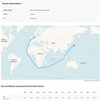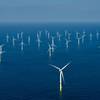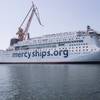IMO Releases Agenda for MEPC
The Marine Environment Protection Committee (MEPC) of the International Maritime Organization (IMO) is expected to adopt proposed amendments to the MARPOL Annex VI regulations to reduce harmful emissions from ships, when it meets for its 58th session from October 6-10 at IMO Headquarters in . The Committee will also continue its work on developing a mandatory regime to control greenhouse gas (GHG) emissions from international shipping.
The Committee has a packed agenda, which also includes the consideration of the draft ship recycling convention and issues relating to the implementation of the 2004 Ballast Water Management Convention.
Prevention of air pollution from ships
The draft revised Annex VI to the MARPOL Convention was agreed at the last MEPC session in April.
The main changes would see progressive substantial reductions in sulphur oxide (SOx) and nitrogen oxide (NOx) emissions from ships.
The revised Annex VI will allow for the designation of Emission Control Areas, for SOx and particulate matter, or NOx, or all three types of emissions from ships, in which more stringent controls would apply.
MARPOL Annex VI Regulations for the Prevention of Air Pollution from Ships entered into force in May 2005 and has, so far, been ratified by 52 countries, representing approximately 80.41 per cent of the gross tonnage of the world's merchant shipping fleet.
The MEPC is also expected to adopt amendments to the NOx Technical Code, including a new Chapter 7 based on the agreed approach for NOx regulation of existing (pre-2000) engines established in the draft amended MARPOL Annex VI.
The draft amended NOx Code includes provisions for direct measurement and monitoring methods, a certification procedure for existing engines, and test cycles to be applied to specified engines.
Greenhouse gas emissions from ships
A Working Group on GHG will be established to consider reduction mechanisms that may form part of a future IMO regime to control GHG emissions from international shipping, and to develop drafts of the actual reduction mechanisms themselves.
The meeting will have, for its consideration, phase 1 of the report of the updated IMO Study on Greenhouse Gas Emissions from Ships, which has been completed by an international consortium of renowned research institutes coordinated by MARINTEK of Norway.
The report of the first intersessional meeting of IMO's Working Group on Greenhouse Gas Emissions from Ships, held in Oslo, Norway (June 23 to 27, 2008), will also be considered by the Committee. That meeting made progress on developing a mandatory CO2 Design Index for new ships and on developing further the interim CO2 Operational Index, and held extensive discussions on best practices for voluntary implementation. The meeting also exchanged views on economic instruments with GHG-reduction potential.
Although, to date, no mandatory GHG instrument for international shipping has been adopted, IMO has given extensive consideration to the matter and is currently working in accordance with an ambitious work plan, due to culminate, in 2009, with the adoption of a binding instrument. IMO is working to have measures in place to control GHG emissions from international shipping before the first commitment period under the Kyoto Protocol expires at the end of 2011.
The MEPC is also expected to consider the related legal aspects and decide whether the GHG regulations should form part of an existing convention or whether an entirely new instrument should be developed and adopted.
The MEPC will also decide on the work needed prior to MEPC 59, to be held in July 2009, when final adoption of a coherent and comprehensive IMO regime to control GHG emissions from ships engaged in international trade is planned.
Recycling of ships
The MEPC is expected to conduct an article-by-article and regulation-by-regulation review of the draft new convention providing globally applicable regulations for ship recycling and for recycling activities, with a view to its circulation for consideration and adoption by the diplomatic conference to be held in , from 11 to 15 May 2009.
The new convention will provide regulations for:
• the design, construction, operation and preparation of ships so as to facilitate safe and environmentally sound recycling, without compromising the safety and operational efficiency of ships;
• the operation of ship recycling facilities in a safe and environmentally sound manner; and
• the establishment of an appropriate enforcement mechanism for ship recycling, incorporating certification and reporting requirements.
Harmful aquatic organisms in ballast water
To date, 16 States have ratified the International Convention for the Control and Management of Ships' Ballast Water and Sediments (BWM Convention), adopted in February 2004, representing about 14.24 per cent of the world's merchant shipping. In accordance with article 18 of the BWM Convention, the Convention will enter into force twelve months after the date on which not less than thirty States, the combined merchant fleets of which constitute not less than thirty-five percent of the gross tonnage of the world's merchant shipping, have become Parties to it.
Bearing in mind the emphasis the international community places on the issue of invasive species in ships' ballast water, the Committee is expected to urge other States to ratify the Convention at the earliest opportunity.
The MEPC will be invited to adopt revised Guidelines for approval of ballast water management systems and Guidelines for ballast water sampling. The Committee will also be invited to approve the Guidance document on arrangements for responding to emergency situations involving ballast water.
The MEPC is expected to decide on proposals for "basic approval" and "final approval" of ballast water management systems that make use of active substances, after consideration of the report of the sixth and seventh meetings of the GESAMP*Ballast Water Working Group, which met in and May and June-July 2008. The Working Group has considered six proposals, and is recommending that basic approval could be granted to three proposals and final approval be granted to two proposals.
Minimizing the risk of ship strikes with cetaceans
The MEPC will consider a proposed draft guidance document on minimizing the risk of ship strikes with cetaceans.
OPRC-HNS implementation
The MEPC will be invited to consider the report of the eighth meeting of the OPRC HNS** Technical Group, which is being held in the week prior to the Committee's session and is expected to consider, for approval, the draft Manual on assessment of oil spill risks and preparedness and the IMO/UNEP Manual on the assessment and restoration of environmental damage following marine oil spills.
Also under consideration will be the draft Manual on chemical pollution to address legal and administrative aspects of HNS incidents; revisions to the Manual on oil pollution, Section I - Prevention; the draft Guidance document on identification and observation of spilled oil; a draft outline for the Technical guidelines on sunken oil assessment and removal techniques; the revised draft Guidance document on the establishment of co-ordinated Joint Information Centres during oil spill response; the revised Guidance document on the use of the Incident Command System (ICS) during oil spill response; a draft Guideline for oil spill response in fast currents; a proposed International guide for oil spill response (OSR) planning and readiness assessments; and draft materials for two introductory training courses on preparedness for and response to HNS pollution incidents in the marine environment.










